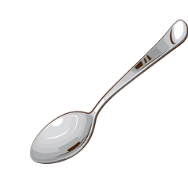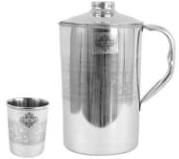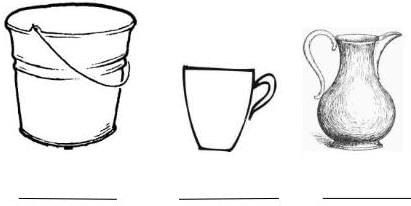Class 4 Maths Worksheet Solutions Chapter 8 Weigh it, Pour it
Q1: Multiple Choice Questions (MCQs).
(i) Estimate the capacity of a table spoon. (a) 15 ml
(a) 15 ml
(b) 1500 ml
(c) 150 ml
(d) 1.5 ml
Ans: (a) 15 ml
(ii) 1/2 Litre is equal to
(a) 200 ml
(b) 500 ml
(c) 100 ml
(d) 700 ml
Ans: (b) 500 ml
As we know, 1000 ml is 1 litre, 500 ml is 1/2 litre
(iii) What is the total weight of 3 bags, each weighing 4 kg ?
(a) 12 kg
(b) 13 kg
(c) 8 kg
(d) 13 kg
Ans: (a),12 kg
3 bags weighing 4kg each = 4 kg + 4 kg + 4 kg = 12 kg
Q2: Fill in the blanks.
(i) 300 ml + _______ = 1 Litre.
(ii) ______ + 480 g = 1 kg
(iii) 500 ml + _______ = 1 Litre.
(iii) 450 ml + _______ = 1 Litre.
Ans:
(i) 300 ml + 700 ml = 1000 ml = 1 litre
(ii) 520 g + 480 g = 1000 g = 1 kg
(iii) 500 ml + 500 ml = 1000ml = 1 litre.
(iv) 450 ml + 550 ml = 1000ml = 1 litre.
Q3: Match the following.

Ans:
Q4: Answer the following Questions.
(i) A shopkeeper uses 20 ml of milk to make one cup of tea; if he sell 50 cups of tea then how much milk did he use?
Ans: 1000 ml
The shopkeeper uses 20 ml of milk to make one cup of tea, and he sells 50 cups of tea. To find the total amount of milk used, we multiply the milk used for one cup by the number of cups:
20 ml × 50 = 1000 ml.
(ii) A pumpkin weighs 6 kg and a watermelon weighs 4 kg. How many kilograms do they weigh together?
Ans: 6 kg + 4 kg = 10 kg
(iii) How many 250 ml of Glasses we need to serve 1000 ml of soup? Ans: 4 glasses as 250ml x 4 = 1000 ml
Ans: 4 glasses as 250ml x 4 = 1000 ml
(iv) There are 4 bricks, each weighing 2 kg. What is the total weight of all the bricks together?
Ans: Each brick weighs 2 kg, and there are 4 bricks. So, we multiply the weight of one brick by the number of bricks:
2 kg × 4 = 8 kg.
Let’s think of it like this: If one brick is 2 kg, two bricks are 2 + 2 = 4 kg, three bricks are 4 + 2 = 6 kg, and four bricks are 6 + 2 = 8 kg.
(v) Arrange the following objects in order of increasing capacity. Write numbers 1,2,3 under them: Ans: 3,1,2
Ans: 3,1,2
(vi) You are trying to pour tea in 50 ml cups from a 250 ml cup, but you spilled 25 ml while doing it. what is amount of tea in 5th cup?
Ans: 25 ml
(vii) A sack of potatoes weighs 7 kg. A smaller sack weighs 4 kg. What is the difference in their weights?
Ans: 7kg - 3kg = 4kg
(viii) Neetu has to take 3 injections in a day for 5 days. If one injection gives her 3 ml of medicine, then how much medicine she is getting every day?
Ans: If one injection gives 3 ml,
two injections give 3 + 3 = 6 ml,
and three injections give 6 + 3 = 9 ml.
So, every day, Neetu gets 9 ml of medicine.
FAQs on Class 4 Maths Worksheet Solutions Chapter 8 Weigh it, Pour it
| 1. What is the purpose of a weighing and pouring activity in Class 4? |  |
| 2. How can I help my child understand measurements better? |  |
| 3. What materials are typically used for weighing and pouring activities? |  |
| 4. How do weighing and pouring activities relate to science and math? |  |
| 5. What are some fun activities to do related to weighing and pouring? |  |





















